formerly eScholarship Editions


|
|
|
|
Your request for similar items found 20 book(s). | Modify Search | Displaying 1 - 20 of 20 book(s) | |
| 1. | 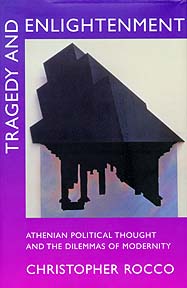 | Title: Tragedy and enlightenment: Athenian political thought, and the dilemmas of modernity Author: Rocco, Christopher 1958- Published: University of California Press, 1997 Subjects: Classics | Classical Philosophy | Classical History | Classical Literature and Language | Social and Political Thought | Social Theory Publisher's Description: Weaving together ancient Greek texts and postmodernist theory, Christopher Rocco addresses the debate between modernity and postmodernity that dominates contemporary theory. Interpreting Greek drama within a critical framework informed by contemporary theorists Foucault, Habermas, Horkheimer and Adorno, Tragedy and Enlightenment makes a sophisticated argument for the continuing relevance of the classical past, focusing on the subject of democracy.The starting point for Rocco's analysis is the impasse in contemporary political and cultural theory over the possibility and desirability of democracy in a postmodern world. After explaining the competing positions in the current debate, Rocco argues that ancient Greek tragedy and dialogue - specifically Sophocles' Oedipus , Plato's Republic and Gorgias , and Aeschylus' Oresteia - suggest alternate constructions for this and other postmodern problems.Rocco gives a detailed analysis of the contemporary divide over the theories of Jürgen Habermas and Michel Foucault and provides a provocative reading of Horkheimer and Adorno's Dialectic of Enlightenment. This original contribution to political and cultural discourse brings us to a new understanding of familiar texts and will alter the grounds of debate for students and scholars of the classical and the contemporary worlds. [brief] Similar Items |
| 2. | 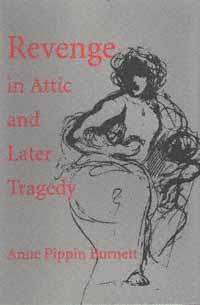 | Title: Revenge in Attic and later tragedy Author: Burnett, Anne Pippin 1925- Published: University of California Press, 1998 Subjects: Classics | Classical Literature and Language | Literature in Translation Publisher's Description: Modern readings of ancient Athenian drama tend to view it as a presentation of social or moral problems, as if ancient drama showed the same realism seen on the present-day stage. Such views are belied by the plays themselves, in which supremely violent actions occur in a legendary time and place distinct both from reality and from the ethics of ordinary life. Offering fresh readings of Attic tragedy, Anne Pippin Burnett urges readers to peel away twentieth-century attitudes toward vengeance and reconsider the revenge tragedies of ancient Athens in their own context.After a consideration of how our view of Elizabethan drama has obscured an accurate view of the ancient tragedies, Burnett reviews early Greek notions of vengeance as expressed in the Odyssey , Heracles' tales, Pindar's odes, Attic judicial processes, and the legend of Harmodius and Aristogeiton. Then, setting aside post-Platonic and Judeo-Christian notions of criminality, she provides new interpretations of all the Attic tragedies in which revenge is a central theme: Aeschylus' Libation Bearers , Sophocles' Ajax, Electra, and Tereus , and Euripides' Children of Heracles, Hecuba, Medea, Electra, and Orestes. Burnett shows that for the ancients, revenge meant a redress of imbalances in both human and divine worlds, achieved through human actions. The vengeful heroines thus appear in a new light. Electra, Hecuba, Medea, and others cease to be the picture of depravity in dramas that are grotesque and sensational, and are instead representative human figures who respond with grandeur to the outsize demands of necessity and supernatural powers. [brief] Similar Items |
| 3. | 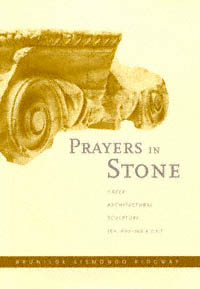 | Title: Prayers in stone: Greek architectural sculpture ca. 600-100 B.C.E Author: Ridgway, Brunilde Sismondo 1929- Published: University of California Press, 1999 Subjects: Classics | Art | Art and Architecture | Art History Publisher's Description: The meaning of architectural sculpture is essential to our understanding of ancient Greek culture. The embellishment of buildings was common for the ancient Greeks, and often provocative. Some ornamental sculpture was placed where, when the building was finished, no mortal eye could view it. And unlike much architectural ornamentation of other cultures, Greek sculpture was often integral to the building, not just as decoration, and could not be removed without affecting the integrity of the building structure. This book is the first comprehensive treatment of the significance of Greek architectural sculpture. Brunilde Sismondo Ridgway, a world-class authority on ancient Greek sculpture, provides a highly informative tour of many dimensions of Greek public buildings - especially temples, tombs, and treasuries - in a text that is at once lucid, accessible, and authoritative.Ridgway's pragmatism and common sense steer us tactfully and clearly through thickets of uncertainty and scholarly disagreement. She refers to a huge number of monuments, and documents her discussions with copious and up-to-date bibliographies. This book is sure to be acknowledged at once as the standard treatment of its important topic. [brief] Similar Items |
| 4. | 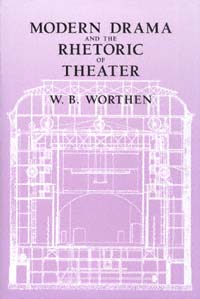 | Title: Modern drama and the rhetoric of theater Author: Worthen, William B 1955- Published: University of California Press, 1991 Subjects: Cinema and Performance Arts | Theatre | Rhetoric Publisher's Description: The history of drama is typically viewed as a series of inert "styles." Tracing British and American stage drama from the 1880s onward, W. B. Worthen instead sees drama as the interplay of text, stage production, and audience.How are audiences manipulated? What makes drama meaningful? Worthen identifies three rhetorical strategies that distinguish an O'Neill play from a Yeats, or these two from a Brecht. Where realistic theater relies on the "natural" qualities of the stage scene, poetic theater uses the poet's word, the text, to control performance. Modern political theater, by contrast, openly places the audience at the center of its rhetorical designs, and the drama of the postwar period is shown to develop a range of post-Brechtian practices that make the audience the subject of the play.Worthen's book deserves the attention of any literary critic or serious theatergoer interested in the relationship between modern drama and the spectator. [brief] Similar Items |
| 5. | 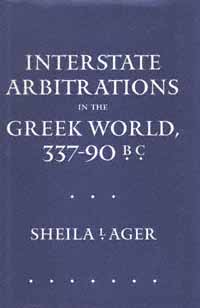 | Title: Interstate arbitrations in the Greek world, 337-90 B.C. Author: Ager, Sheila L 1956- Published: University of California Press, 1997 Subjects: Classics | Classical History | Ancient History Publisher's Description: A great deal of information has come to light over the past several decades about the role of arbitration between the Greek states. Arbitration and mediation were, in fact, central institutions in Hellenistic public life. In this comprehensive study, Sheila Ager brings together the scattered body of literary and epigraphical sources on arbitration, together with up-to-date bibliographic references, and commentary.The sources collected here range widely; Ager presents an exhaustive record of documents ranging from the settlement of a minor territorial squabble between two tiny city-states to the resolution of major conflicts separating the great powers of the day. In addition, Ager's introduction sets the documents in historical context and outlines distinctions among categories of arbitration. The work also includes indices to literary passages, inscriptions, persons, places, subjects, and Greek and Latin terms in the documents. This collection of many previously inaccessible texts will become a primary resource for any scholar or student working in the field of Hellenistic history. [brief] Similar Items |
| 6. | 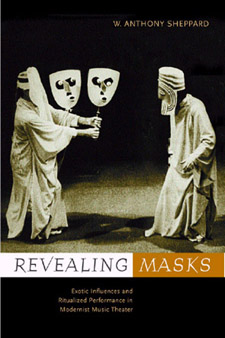 | Title: Revealing masks: exotic influences and ritualized performance in modernist music theater Author: Sheppard, William Anthony 1969- Published: University of California Press, 2001 Subjects: Music | American Music | Contemporary Music | Ethnomusicology | Opera | Musicology | Intellectual History Publisher's Description: W. Anthony Sheppard considers a wide-ranging constellation of important musical works in this fascinating exploration of ritualized performance in twentieth-century music. Revealing Masks uncovers the range of political, didactic, and aesthetic intents that inspired the creators of modernist music theater. Sheppard is especially interested in the use of the "exotic" in techniques of masking and stylization, identifying Japanese Noh, medieval Christian drama, and ancient Greek theater as the most prominent exotic models for the creation of "total theater." Drawing on an extraordinarily diverse - and in some instances, little-known - range of music theater pieces, Sheppard cites the work of Igor Stravinsky, Benjamin Britten, Arthur Honegger, Peter Maxwell Davies, Harry Partch, and Leonard Bernstein, as well as Andrew Lloyd Webber and Madonna. Artists in literature, theater, and dance - such as William Butler Yeats, Paul Claudel, Bertolt Brecht, Isadora Duncan, Ida Rubenstein, and Edward Gordon Craig--also play a significant role in this study. Sheppard poses challenging questions that will interest readers beyond those in the field of music scholarship. For example, what is the effect on the audience and the performers of depersonalizing ritual elements? Does borrowing from foreign cultures inevitably amount to a kind of predatory appropriation? Revealing Masks shows that compositional concerns and cultural themes manifested in music theater are central to the history of twentieth-century Euro-American music, drama, and dance. [brief] Similar Items |
| 7. | 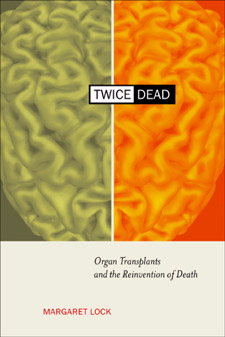 | Title: Twice dead: organ transplants and the reinvention of death Author: Lock, Margaret M Published: University of California Press, 2001 Subjects: Anthropology | Medical Anthropology | Cultural Anthropology | Ethics | Sociology | Sociology | Ethics | Sociology | Ethnic Studies | Ethnic Studies Publisher's Description: Tales about organ transplants appear in mythology and folk stories, and surface in documents from medieval times, but only during the past twenty years has medical knowledge and technology been sufficiently advanced for surgeons to perform thousands of transplants each year. In the majority of cases individuals diagnosed as "brain dead" are the source of the organs without which transplants could not take place. In this compelling and provocative examination, Margaret Lock traces the discourse over the past thirty years that contributed to the locating of a new criterion of death in the brain, and its routinization in clinical practice in North America. She compares this situation with that in Japan where, despite the availability of the necessary technology and expertise, brain death was legally recognized only in 1997, and then under limited and contested circumstances. Twice Dead explores the cultural, historical, political, and clinical reasons for the ready acceptance of the new criterion of death in North America and its rejection, until recently, in Japan, with the result that organ transplantation has been severely restricted in that country. This incisive and timely discussion demonstrates that death is not self-evident, that the space between life and death is historically and culturally constructed, fluid, multiple, and open to dispute. In addition to an analysis of that professional literature on and popular representations of the subject, Lock draws on extensive interviews conducted over ten years with physicians working in intensive care units, transplant surgeons, organ recipients, donor families, members of the general public in both Japan and North America, and political activists in Japan opposed to the recognition of brain death. By showing that death can never be understood merely as a biological event, and that cultural, medical, legal, and political dimensions are inevitably implicated in the invention of brain death, Twice Dead confronts one of the most troubling questions of our era. [brief] Similar Items |
| 8. | 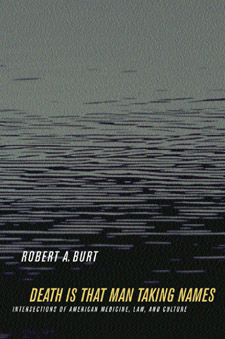 | Title: Death is that man taking names: intersections of American medicine, law, and culture Author: Burt, Robert 1939- Published: University of California Press, 2002 Subjects: Law | Health Care | History of Medicine | Ethics | Religion Publisher's Description: The American culture of death changed radically in the 1970s. For terminal illnesses, hidden decisions by physicians were rejected in favor of rational self-control by patients asserting their "right to die" - initially by refusing medical treatment and more recently by physician-assisted suicide. This new claim rested on two seemingly irrefutable propositions: first, that death can be a positive good for individuals whose suffering has become intolerable; and second, that death is an inevitable and therefore morally neutral biological event. Death Is That Man Taking Names suggests, however, that a contrary attitude persists in our culture - that death is inherently evil, not just in practical but also in moral terms. The new ethos of rational self-control cannot refute but can only unsuccessfully try to suppress this contrary attitude. The inevitable failure of this suppressive effort provokes ambivalence and clouds rational judgment in many people's minds and paradoxically leads to inflictions of terrible suffering on terminally ill people. Judicial reforms in the 1970s of abortion and capital punishment were driven by similarly high valuations of rationality and public decision-making - rejecting physician control over abortion in favor of individual self-control by pregnant women and subjecting unsupervised jury decisions for capital punishment to supposed rationally guided supervision by judges. These reforms also attempt to suppress persistently ambivalent attitudes toward death, and are therefore prone to inflicting unjustified suffering on pregnant women and death-sentenced prisoners. In this profound and subtle account of psychological and social forces underlying American cultural attitudes toward death, Robert A. Burt maintains that unacknowledged ambivalence is likely to undermine the beneficent goals of post-1970s reforms and harm the very people these changes were intended to help. [brief] Similar Items |
| 9. | 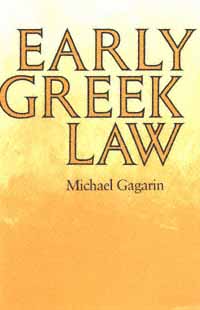 | Title: Early Greek law Author: Gagarin, Michael Published: University of California Press, 1989 Subjects: Classics | Classical Politics | Law Publisher's Description: Drawing on the evidence of anthropology as well as ancient literature and inscriptions, Gagarin examines the emergence of law in Greece from the 8th through the 6th centuries B.C., that is, from the oral culture of Homer and Hesiod to the written enactment of codes of law in most major cities. Similar Items |
| 10. | 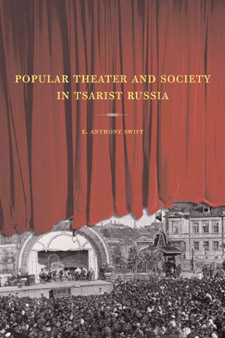 | Title: Popular theater and society in Tsarist Russia Author: Swift, Eugene Anthony Published: University of California Press, 2002 Subjects: History | European History | Russian and Eastern European Studies | Popular Culture | European Literature | European Studies Publisher's Description: This is the most comprehensive study available of the popular theater that developed during the last decades of tsarist Russia. Swift examines the origins and significance of the new "people's theaters" that were created for the lower classes in St. Petersburg and Moscow between 1861 and 1917. His extensively researched study, full of anecdotes from the theater world of the day, shows how these people's theaters became a major arena in which the cultural contests of late imperial Russia were played out and how they contributed to the emergence of an urban consumer culture during this period of rapid social and political change. Swift illuminates many aspects of the story of these popular theaters - the cultural politics and aesthetic ambitions of theater directors and actors, state censorship politics and their role in shaping the theatrical repertoire, and the theater as a vehicle for social and political reform. He looks at roots of the theaters, discusses specific theaters and performances, and explores in particular how popular audiences responded to the plays. [brief] Similar Items |
| 11. | 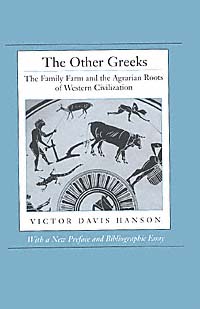 | Title: The other Greeks: the family farm and the agrarian roots of western civilization Author: Hanson, Victor Davis Published: University of California Press, 1999 Subjects: Classics | European History Publisher's Description: For generations, scholars have focused on the rise of the Greek city-state and its brilliant cosmopolitan culture as the ultimate source of the Western tradition in literature, philosophy, and politics. This passionate book leads us outside the city walls to the countryside, where the vast majority of the Greek citizenry lived, to find the true source of the cultural wealth of Greek civilization. Victor Hanson shows that the real "Greek revolution" was not merely the rise of a free and democratic urban culture, but rather the historic innovation of the independent family farm.The farmers, vinegrowers, and herdsmen of ancient Greece are "the other Greeks," who formed the backbone of Hellenic civilization. It was these tough-minded, practical, and fiercely independent agrarians, Hanson contends, who gave Greek culture its distinctive emphasis on private property, constitutional government, contractual agreements, infantry warfare, and individual rights. Hanson's reconstruction of ancient Greek farm life, informed by hands-on knowledge of the subject (he is a fifth-generation California vine- and fruit-grower) is fresh, comprehensive, and absorbing. His detailed chronicle of the rise and tragic fall of the Greek city-state also helps us to grasp the implications of what may be the single most significant trend in American life today - the imminent extinction of the family farm. [brief] Similar Items |
| 12. |  | Title: Refiguring American film genres: history and theory Author: Browne, Nick Published: University of California Press, 1998 Subjects: American Studies | Film | Cultural Anthropology Publisher's Description: This collection of essays by leading American film scholars charts a whole new territory in genre film criticism. Rather than assuming that genres are self-evident categories, the contributors offer innovative ways to think about types of films, and patterns within films, in a historical context. Challenging familiar attitudes, the essays offer new conceptual frameworks and a fresh look at how popular culture functions in American society. The range of essays is exceptional, from David J. Russell's insights into the horror genre to Carol J. Clover's provocative take on "trial films" to Leo Braudy's argument for the subject of nature as a genre. Also included are essays on melodrama, race, film noir , and the industrial context of genre production. The contributors confront the poststructuralist critique of genre head-on; together they are certain to shape future debates concerning the viability and vitality of genre in studying American cinema. [brief] Similar Items |
| 13. | 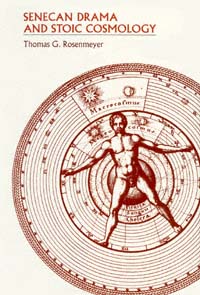 | Title: Senecan drama and stoic cosmology Author: Rosenmeyer, Thomas G Published: University of California Press, 1989 Subjects: Classics | Classical Literature and Language | Classical Philosophy | Theatre Publisher's Description: Lucius Annaeus Seneca, Nero's tutor and advisor, wrote philosophical essays, some of them in the form of letters, and dramas on Greek mythological topics, which since the early Renaissance have exercised a powerful influence on the European theater. Because in his essays Seneca, in his own eclectic way, subscribes to the philosophy of the Stoic school, scholars and critics have long been asking the question whether the plays, also, could be regarded as transmitters of Stoic thought. Various answers, ranging from a categorical no to an uneasy yes, have been given.With few exceptions, the students who have concerned themselves with this question have looked for their enlightenment in Stoic psychology and Stoic ethics. In this book, Thomas G. Rosenmeyer proposes instead to look at the Stoic science of nature, of the world and human beings in the world, as a more plausible grounding for the difference between Senecan drama and its Greek predecessors. In the process of looking at what the Stoics, especially the early Stoics, had to say about the forces determining natural phenomena, the author uncovers a deeply pessimistic strain in Stoic cosmology, and an interest in physicality and environmental tension, that he finds replicated in the theater, not only of Seneca, but also of the later European tradition indebted to him. [brief] Similar Items |
| 14. | 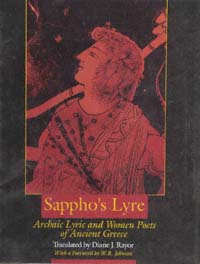 | Title: Sappho's lyre: archaic lyric and women poets of ancient Greece Author: Rayor, Diane J Published: University of California Press, 1991 Subjects: Classics | Classical Literature and Language | Literature in Translation | Poetry Publisher's Description: Sappho sang her poetry to the accompaniment of the lyre on the Greek island of Lesbos over 2500 years ago. Throughout the Greek world, her contemporaries composed lyric poetry full of passion, and in the centuries that followed the golden age of archaic lyric, new forms of poetry emerged. In this unique anthology, today's reader can enjoy the works of seventeen poets, including a selection of archaic lyric and the complete surviving works of the ancient Greek women poets - the latter appearing together in one volume for the first time. Sappho's Lyre is a combination of diligent research and poetic artistry. The translations are based on the most recent discoveries of papyri (including "new" Archilochos and Stesichoros) and the latest editions and scholarship. The introduction and notes provide historical and literary contexts that make this ancient poetry more accessible to modern readers.Although this book is primarily aimed at the reader who does not know Greek, it would be a splendid supplement to a Greek language course. It will also have wide appeal for readers of' ancient literature, women's studies, mythology, and lovers of poetry. [brief] Similar Items |
| 15. | 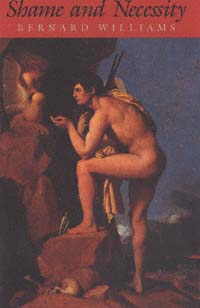 | Title: Shame and necessity Author: Williams, Bernard Arthur Owen Published: University of California Press, 1993 Subjects: Philosophy | Ethics | Classics | Classical Philosophy | Literary Theory and Criticism Publisher's Description: We tend to suppose that the ancient Greeks had primitive ideas of the self, of responsibility, freedom, and shame, and that now humanity has advanced from these to a more refined moral consciousness. Bernard Williams's original and radical book questions this picture of Western history. While we are in many ways different from the Greeks, Williams claims that the differences are not to be traced to a shift in these basic conceptions of ethical life. We are more like the ancients than we are prepared to acknowledge, and only when this is understood can we properly grasp our most important differences from them, such as our rejection of slavery.The author is a philosopher, but much of his book is directed to writers such as Homer and the tragedians, whom he discusses as poets and not just as materials for philosophy. At the center of his study is the question of how we can understand Greek tragedy at all, when its world is so far from ours.Williams explains how it is that when the ancients speak, they do not merely tell us about themselves, but about ourselves. Shame and Necessity gives a new account of our relations to the Greeks, and helps us to see what ethical ideas we need in order to live in the modern world. [brief] Similar Items |
| 16. | 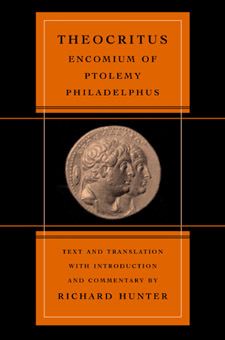 | Title: Encomium of Ptolemy Philadelphus Author: Theocritus Published: University of California Press, 2003 Subjects: Classics | Classical Literature and Language | Poetry Publisher's Description: Under Ptolemy II Philadelphus, who ruled Egypt in the middle of the third century B.C.E., Alexandria became the brilliant multicultural capital of the Greek world. Theocritus's poem in praise of Philadelphus - at once a Greek king and an Egyptian pharaoh - is the only extended poetic tribute to this extraordinary ruler that survives. Combining the Greek text, an English translation, a full line-by-line commentary, and extensive introductory studies of the poem's historical and literary context, this volume also offers a wide-ranging and far-reaching consideration of the workings and representation of poetic patronage in the Ptolemaic age. In particular, the book explores the subtle and complex links among Theocritus's poem, modes of praise drawn from both Greek and Egyptian traditions, and the subsequent flowering of Latin poetry in the Augustan age. As the first detailed account of this important poem to show how Theocritus might have drawn on the pharaonic traditions of Egypt as well as earlier Greek poetry, this book affords unique insight into how praise poetry for Ptolemy and his wife may have helped to negotiate the adaptation of Greek culture that changed conditions of the new Hellenistic world. Invaluable for its clear translation and its commentary on genre, dialect, diction, and historical reference in relation to Theocritus's Encomium, the book is also significant for what it reveals about the poem's cultural and social contexts and about Theocritus' devices for addressing his several readerships. COVER IMAGE: The image on the front cover of this book is incorrectly identified on the jacket flap. The correct caption is: Gold Oktadrachm depicting Ptolemy II and Arsinoe (mid-third century BCE; by permission of the Museum of Fine Arts, Boston). [brief] Similar Items |
| 17. | 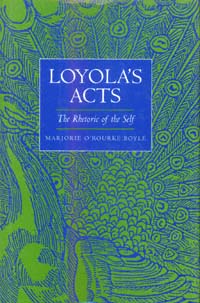 | Title: Loyola's acts: the rhetoric of the self Author: Boyle, Marjorie O'Rourke 1943- Published: University of California Press, 1997 Subjects: Literature | Renaissance History | Christianity | Rhetoric | Art History | Medieval History Publisher's Description: This revisionist view of Ignatius Loyola argues that his "autobiography" - until now taken to be a literal, documentary account - is in reality a work of rhetoric, a moral narrative that exploits the techniques of fiction. In radically reinterpreting this canonical text, our main source of information about the founder of the largest and most powerful religious order in Roman Catholicism, Boyle paints a vivid picture of Loyola's world. She surveys rhetorical and artistic theory, religious iconography, everyday custom, and an astonishing array of scenes and subjects: from curiosity, to codes of honor, to the holy places of Spain, to the significance of apparitions and flying serpents.Written in the tradition of Renaissance studies on individualism, Loyola's Acts engages current interest in autobiography and in the history of private life. The book also provides a powerful heuristic for interpreting a wide range of texts of the Christian tradition. Finally, this secular treatment of a canonized saint provides revealing insights into how a prestigious sixteenth-century figure like Loyola understood himself. [brief] Similar Items |
| 18. | 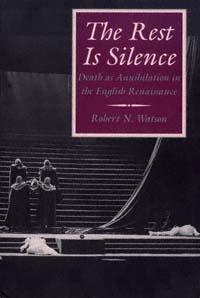 | Title: The rest is silence: death as annihilation in the English Renaissance Author: Watson, Robert N Published: University of California Press, 1995 Subjects: Literature | English Literature | Literary Theory and Criticism | Renaissance Literature Publisher's Description: How did the fear of death coexist with the promise of Christian afterlife in the culture and literature of the English Renaissance? Robert Watson exposes a sharp edge of blasphemous protest against mortality that runs through revenge plays such as The Spanish Tragedy and Hamlet , and through plays of procreation such as Measure for Measure and Macbeth . Tactics of denial appear in the vengefulness that John Donne directs toward female bodies for failing to bestow immortality, and in the promise of renewal that George Herbert sets against the threat of closure.Placing these literary manifestations in the context of specific Jacobean deathbed crises and modern cultural distortions, Watson explores the psychological roots and political consequences of denying that death permanently erases sensation and consciousness. [brief] Similar Items |
| 19. | 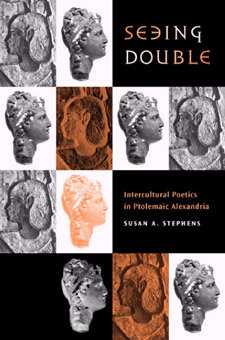 | Title: Seeing double: intercultural poetics in Ptolemaic Alexandria Author: Stephens, Susan A Published: University of California Press, 2003 Subjects: Classics | Classical Literature and Language | Poetry | Classical Politics Publisher's Description: When, in the third century B.C.E., the Ptolemies became rulers in Egypt, they found themselves not only kings of a Greek population but also pharaohs for the Egyptian people. Offering a new and expanded understanding of Alexandrian poetry, Susan Stephens argues that poets such as Callimachus, Theocritus, and Apollonius proved instrumental in bridging the distance between the two distinct and at times diametrically opposed cultures under Ptolemaic rule. Her work successfully positions Alexandrian poetry as part of the dynamic in which Greek and Egyptian worlds were bound to interact socially, politically, and imaginatively. The Alexandrian poets were image-makers for the Ptolemaic court, Seeing Double suggests; their poems were political in the broadest sense, serving neither to support nor to subvert the status quo, but to open up a space in which social and political values could be imaginatively re-created, examined, and critiqued. Seeing Double depicts Alexandrian poetry in its proper context - within the writing of foundation stories and within the imaginative redefinition of Egypt as "Two Lands" - no longer the lands of Upper and Lower Egypt, but of a shared Greek and Egyptian culture. [brief] Similar Items |
| 20. | 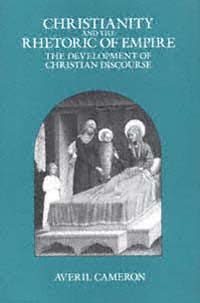 | Title: Christianity and the rhetoric of empire: the development of Christian discourse Author: Cameron, Averil Published: University of California Press, 1991 Subjects: Classics | Classical Religions | Classical History | History | Christianity | Ancient History | Rhetoric Publisher's Description: Many reasons can be given for the rise of Christianity in late antiquity and its flourishing in the medieval world. In asking how Christianity succeeded in becoming the dominant ideology in the unpromising circumstances of the Roman Empire, Averil Cameron turns to the development of Christian discourse over the first to sixth centuries A.D., investigating the discourse's essential characteristics, its effects on existing forms of communication, and its eventual preeminence. Scholars of late antiquity and general readers interested in this crucial historical period will be intrigued by her exploration of these influential changes in modes of communication.The emphasis that Christians placed on language - writing, talking, and preaching - made possible the formation of a powerful and indeed a totalizing discourse, argues the author. Christian discourse was sufficiently flexible to be used as a public and political instrument, yet at the same time to be used to express private feelings and emotion. Embracing the two opposing poles of logic and mystery, it contributed powerfully to the gradual acceptance of Christianity and the faith's transformation from the enthusiasm of a small sect to an institutionalized world religion. [brief] Similar Items |